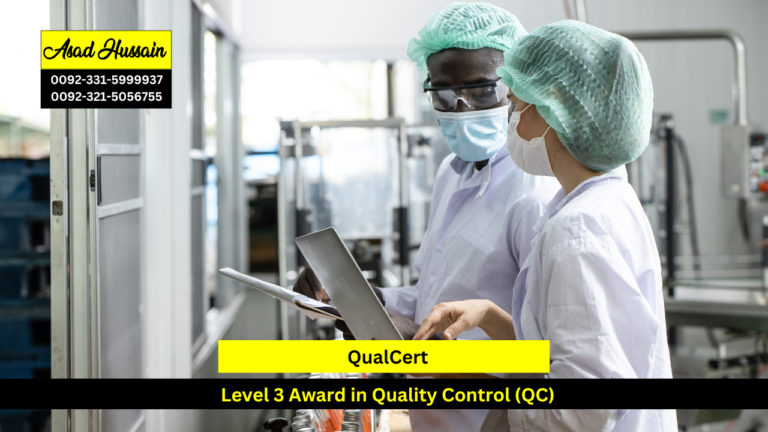The ICTQual AB Level 3 Diploma in Instrumental Quality Assurance and Quality Control (QA/QC) is a globally recognized qualification designed to equip learners with the technical expertise and analytical skills required to ensure precision, reliability, and compliance in industrial processes. In today’s highly competitive and technology-driven industries, maintaining consistent quality standards is critical to operational success and global recognition. This course provides a solid foundation in quality control (QC) and quality assurance (QA) methodologies, empowering learners to play a vital role in inspection, testing, and process verification across various engineering sectors.
ICTQual AB Level 3 Diploma in Instrumental Quality Assurance and Quality Control QA/QC focuses on practical and theoretical knowledge of instrumentation quality assurance, industrial inspection techniques, and measurement systems, aligning with international industry standards. Learners gain a deep understanding of how to maintain process accuracy, implement testing protocols, and apply statistical process control methods to ensure compliance with ISO and QA/QC procedures. This ensures that graduates are well-prepared to handle quality challenges in sectors such as oil and gas, construction, manufacturing, and energy production.
A major highlight of this program is its emphasis on hands-on experience in calibration, inspection, and data validation, enabling learners to develop the technical confidence necessary for workplace performance. Through structured assignments and practical simulations, students learn to interpret engineering drawings, use precision instruments, and evaluate process efficiency using standardized quality tools. The diploma strengthens both technical and analytical capabilities essential for instrumentation quality control professionals.
The ICTQual AB Level 3 Diploma in Instrumental QA/QC also focuses on developing problem-solving and decision-making skills. Learners are trained to identify defects, ensure compliance with safety and quality protocols, and implement effective corrective actions in real-world industrial scenarios. The program’s Instrumental Quality Assurance holistic approach bridges the gap between academic learning and industrial application, preparing learners for career advancement in quality assurance and control engineering.
Program Highlights
Mandatory Units
- Principles of Instrumental Quality Assurance and Inspection
- Material Receiving, Handling, and Preservation
- International Codes and Standards for Instrumentation
- Instrument Tubing and Installation Practices
- Instrument Elements and Process Variables
- Loop Checking, Testing, and Commissioning
The ICTQual AB Level 3 Diploma in Instrumental Quality Assurance and Quality Control (QA/QC) is designed to prepare learners for professional roles in industrial quality inspection, testing, and calibration. To ensure that participants are adequately equipped for both the academic and practical components of the program, specific entry requirements must be met. These requirements help maintain the course’s academic standards and ensure learners have the foundational knowledge, discipline, and technical aptitude necessary to succeed in this highly specialized field.
Age Requirements
- Applicants must be at least 18 years of age at the time of enrollment.
- This age requirement ensures that learners possess the maturity and responsibility needed to handle the technical, analytical, and safety aspects of quality assurance and control work. Industrial quality control often involves handling sensitive instruments, performing inspections, and making critical decisions — all of which require a professional level of focus and accountability.
Educational Requirements
- Learners should have successfully completed secondary education or an equivalent qualification, such as GCSEs, a technical diploma, or a vocational certificate.
- A background in science, mathematics, physics, or engineering is highly recommended, as these subjects provide the essential foundation for understanding measurement principles, inspection methods, and quality control techniques covered in the course. This educational grounding supports comprehension of industrial drawings, specifications, and testing standards essential for QA/QC operations.
Professional Experience
- Although previous work experience is not mandatory, it is beneficial for learners to have some exposure to industrial, mechanical, or engineering environments.
- Individuals currently working or aspiring to work as technicians, inspectors, or maintenance personnel in industrial facilities will find this course particularly valuable. Practical experience with inspection tools, calibration systems, or process equipment enhances learners’ ability to apply theoretical knowledge in real-world industrial quality assurance scenarios.
English Language Proficiency
- Since the course is delivered in English, learners must have a sufficient level of proficiency in reading, writing, speaking, and listening.
- Applicants whose first language is not English should demonstrate competence equivalent to an IELTS Level 5.0 or higher. This ensures learners can effectively understand technical documentation, complete written assignments, and communicate professionally during practical and theoretical assessments.
The ICTQual AB Level 3 Diploma in Instrumental Quality Assurance and Quality Control (QA/QC) serves as an excellent foundation for learners aiming to advance into more specialized or senior roles in quality management and inspection. Upon completion, learners can progress to higher-level qualifications such as the ICTQual AB Level 4 Diploma in Industrial Instrumentation and Control Systems, enabling them to further expand their technical expertise and career opportunities in the global industrial sector.
The ICTQual AB Level 3 Diploma in Instrumental Quality Assurance and Quality Control (QA/QC) is designed to equip learners with a comprehensive understanding of the principles, techniques, and procedures essential for ensuring quality and reliability in industrial instrumentation systems. Through this qualification, learners develop the technical expertise and practical competence needed to perform inspection, testing, calibration, and documentation tasks in compliance with international quality standards. Each unit is structured to build progressive skills in instrumentation QA/QC, enabling learners to apply their knowledge effectively within industrial and engineering environments.
Principles of Instrumental Quality Assurance and Inspection
This unit provides learners with the foundational concepts of quality assurance, quality control, and inspection techniques used in instrumentation projects.
• Understand the key principles of quality management systems (QMS) and their role in instrumentation and industrial operations.
• Apply QA/QC methodologies to assess compliance with technical drawings, specifications, and project documentation.
• Identify and evaluate quality parameters and inspection checkpoints across different stages of instrumentation work.
• Perform visual and dimensional inspection of instruments and components following approved QA/QC procedures.
• Maintain quality documentation, inspection records, and reports in accordance with industry and organizational requirements.
Material Receiving, Handling, and Preservation
This unit focuses on the correct procedures for managing, storing, and preserving instrumentation materials to ensure their integrity and functionality.
• Inspect and verify instrumentation materials upon receipt to ensure compliance with purchase orders and specifications.
• Apply proper handling techniques to prevent damage, contamination, or deterioration of sensitive instruments and components.
• Implement storage and preservation procedures in accordance with manufacturer and project guidelines.
• Understand traceability requirements for materials and maintain accurate inventory and documentation records.
• Ensure adherence to safety and environmental standards during material handling and preservation processes.
International Codes and Standards for Instrumentation
This unit introduces learners to the global codes, standards, and regulations that govern instrumentation QA/QC practices.
• Identify and interpret key international standards such as ISO, IEC, ISA, and ANSI related to instrumentation and control.
• Apply standard specifications for installation, calibration, and testing to ensure compliance with industry benchmarks.
• Evaluate the significance of documentation and certification in meeting international quality assurance requirements.
• Understand the role of regulatory compliance in maintaining system integrity and operational safety.
• Integrate global standards into QA/QC inspection and audit activities within industrial environments.
Instrument Tubing and Installation Practices
This unit develops the learner’s ability to perform and inspect tubing, fittings, and installation tasks in instrumentation systems.
• Understand the principles and layout techniques of tubing and fittings in industrial instrumentation systems.
• Identify different types of tubing materials, fittings, and joints used for process and pneumatic connections.
• Inspect and verify tubing installations for leaks, alignment, and conformity with technical drawings and standards.
• Apply correct methods for tube bending, routing, clamping, and connection to prevent vibration and system failure.
• Ensure all installation activities comply with QA/QC procedures and international safety regulations.
Instrument Elements and Process Variables
This unit enhances learners’ understanding of instrumentation elements, process variables, and their significance in control systems.
• Recognize key process variables such as pressure, temperature, flow, and level, and their measurement techniques.
• Identify different types of sensors, transmitters, and control valves used in industrial instrumentation.
• Apply QA/QC procedures to inspect and verify the calibration, installation, and operation of instrumentation elements.
• Analyze process control data to evaluate system performance and identify potential faults or calibration errors.
• Understand how accurate instrumentation contributes to process efficiency, safety, and product quality.
Loop Checking, Testing, and Commissioning
This unit prepares learners to perform loop checking, testing, and commissioning activities essential for system validation and operational readiness.
• Conduct pre-commissioning and loop checking procedures to verify the integrity of control circuits and signal continuity.
• Perform functional testing of instruments and control loops to ensure compliance with design and operational requirements.
• Record and evaluate test results using standard documentation and reporting formats.
• Identify and troubleshoot common faults encountered during commissioning and operational testing.
• Ensure safe, efficient, and compliant handover of systems following final QA/QC verification and commissioning.
The ICTQual AB Level 3 Diploma in Instrumental Quality Assurance and Quality Control (QA/QC), learners will have developed the competence to inspect, test, and maintain industrial instrumentation systems according to international QA/QC standards. Graduates will be well-prepared to work in diverse industries such as oil and gas, power generation, manufacturing, and process automation — ensuring that all instrumentation processes meet global quality, safety, and operational excellence benchmarks.
The ICTQual AB Level 3 Diploma in Instrumental Quality Assurance and Quality Control (QA/QC) is a globally recognized qualification designed for individuals who aspire to build a professional career in the field of instrumentation quality assurance, inspection, and testing. In today’s competitive industrial sector, ensuring the accuracy, reliability, and compliance of instrumentation systems is essential for maintaining operational excellence. This diploma Instrumental Quality Assurance equips learners with the technical knowledge and hands-on skills needed to perform inspection, calibration, verification, and documentation tasks in accordance with international quality standards. The program focuses on developing precision, analytical ability, and adherence to QA/QC principles across diverse industrial environments.
Instrumentation QA/QC Technicians and Inspectors
• Professionals currently employed or aspiring to work in instrumentation inspection, calibration, and quality control departments.
• Technicians responsible for performing quality checks, verification, and validation of instrumentation systems.
• Individuals aiming to strengthen their knowledge of QA/QC procedures, inspection methods, and Instrumental Quality Assurance ,compliance documentation.
• Learners focused on mastering the techniques of ensuring system integrity and operational reliability.
• Professionals committed to upholding quality standards and minimizing process deviations through effective QA/QC practices.
Process and Quality Control Engineers
• Engineers and technicians involved in process industries such as oil and gas, petrochemical, power generation, and manufacturing.
• Professionals seeking to enhance their understanding of process variables, instrumentation accuracy, and calibration systems.
• Individuals responsible for maintaining quality assurance in process measurement and control operations.
• Learners focused on improving process consistency, system performance, Instrumental Quality Assurance , and equipment reliability through QA/QC applications.
• Engineers committed to integrating international standards into instrumentation and production workflows.
Instrumentation and Inspection Specialists
• Individuals specializing in the inspection, calibration, and testing of industrial instruments and control systems.
• Technicians responsible for verifying measurement accuracy, loop checking, and commissioning in QA/QC projects.
• Professionals aiming to gain expertise in interpreting international standards such as ISO, IEC, and ANSI.
• Learners focused on the selection and application of correct testing instruments and methods for quality verification.
• Specialists dedicated to ensuring system compliance and documentation integrity in industrial projects.
Maintenance and Reliability Professionals
• Engineers and technicians engaged in preventive maintenance, system reliability, and quality improvement activities.
• Professionals responsible for detecting, reporting, and resolving quality issues related to instrumentation systems.
• Individuals aiming to develop a strong foundation in inspection techniques, testing protocols, and calibration standards.
• Learners focused on enhancing reliability, operational efficiency, Instrumental Quality Assurance , and safety through systematic QA/QC practices.
• Technicians dedicated to promoting continuous improvement and compliance with global industry standards.
Supervisors and Quality Assurance Coordinators
• Supervisors overseeing quality assurance and inspection teams in industrial and construction projects.
• Quality coordinators responsible for managing QA/QC documentation, inspection schedules, and compliance audits.
• Professionals ensuring that all instrumentation and control processes meet specified standards and project requirements.
• Managers focused on improving organizational quality culture through effective leadership and monitoring.
• Leaders dedicated to promoting transparency, accountability, and precision in all QA/QC operations.
Career-Focused Learners and Future Quality Professionals
• Individuals aspiring to build or advance their careers as QA/QC Instrument Technicians, Quality Inspectors, or Calibration Engineers.
• Learners preparing for roles in industrial instrumentation, testing laboratories, or project quality management.
• Professionals seeking to gain a competitive edge through international certification in instrumentation QA/QC.
• Career-driven individuals motivated to contribute to the quality and reliability of industrial processes and equipment.
• Learners aiming to progress to advanced qualifications such as the ICTQual AB Level 4 Diploma in Quality Assurance and Control Systems or equivalent programs in industrial QA/QC.
The ICTQual AB Level 3 Diploma in Instrumental Quality Assurance and Quality Control (QA/QC) is ideal for learners who are passionate about maintaining quality, safety, and precision in industrial instrumentation. This qualification Instrumental Quality Assurance prepares graduates to perform critical QA/QC functions in various industries where reliability and compliance are vital. Upon completion, learners will be ready to take on professional roles in inspection, calibration, and testing within process industries, ensuring operational excellence and adherence to international quality standards.







